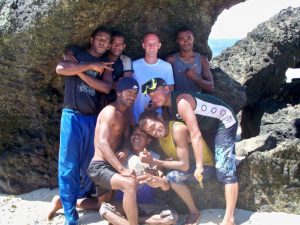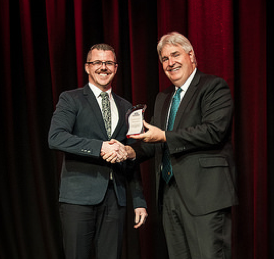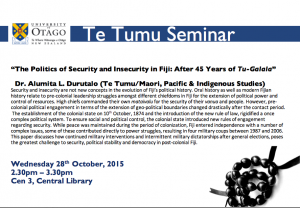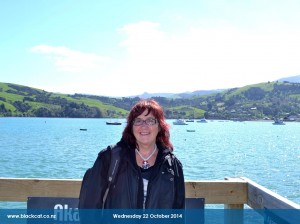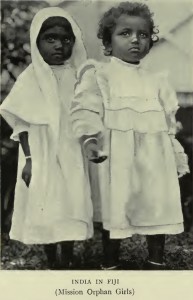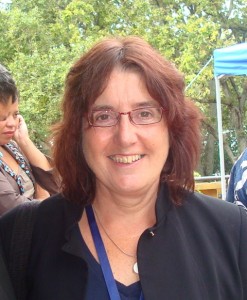Te Tumu’s “new” lecturer
Te Tumu is excited to announce the appointment of a “new” lecturer. Of course, many will already know Dr Erica Newman, as she has studied and worked in Te Tumu in various roles over many years. Moving into a confirmation-path lecturer’s role in the Indigenous Development programme is the culmination of all her hard work.
Erica’s research has focused on children and adoption. She undertook her BA (Hons) in Te Tumu, completing a dissertation on Māori, European and “half-caste” children in New Zealand from 1840-1852, with a specific focus on the care of children. She followed this with her MA, a history of adoption/whāngai within Aotearoa New Zealand, including the concept of “whāngai”. This research contains a special emphasis on transracially adopted Māori children and its effects on future generations, something pertinent to Erica’s own whakapapa. Her PhD, completed in 2018, looked at the adoption of children in Fiji during British colonial rule of 1874- 1970, including both indigenous and colonial practices and institutions. Erica has also attended various conferences, and published on her research, including an article on transracial adoption in the prestigious American Indian Quarterly in 2013.
More recently Erica has managed to get through to the second stage of a Fast Start Marsden application on the historical effect of adoptions for descendants of Māori adoptees, how adoption not only affects the adoptee, adoptive parents and biological parents but the ripple effect carried down to following generations. This includes the importance of whakapapa in how Māori adoptees are able to, or not able to, identify themselves as Māori. We have our fingers crossed that Erica’s Marsden bid is successful, as this will be exciting and useful research.
Erica has managed a strong research trajectory despite a heavy teaching load. She has long been responsible for Te Tumu’s giant MAOR102 Māori Society paper, managing hundreds of students each year and a troupe of tutors. Last year she was part of team organising Te Tumu’s modules in the (even larger) POPH192 Population Health paper. But since 2008 Erica has also taught in a variety of other papers in all of Te Tumu’s programmes over the years, as well have undertaken supervision duties in the Master of Indigenous Studies programme. We’ve seen a number of innovations, such as an in-house journal for the MAOR202 Tikanga and Māori paper, to give undergraduate students an idea of what it is like to publish an article, and developing special tutorials for MAOR102 students who come to university already very knowledgeable on tikanga Māori.
So in many ways, not too much is going to change for Erica—she will still be working flat-tack on her research and teaching. It’s just wonderful that we can all celebrate in her success.
Neigbourly success, on a Pacific theme.
Earlier this year, due to move logistics within the Humanities Division, some Te Tumu staff had to shift rooms. This led to our Pacific Island Studies team sharing the fourth floor with academics from the Religious Studies programme. Te Tumu would like to congratulate one of our new neighbours, Dr John Shaver, for winning a Marsden Grant to undertake further research on religious practice in Fiji.
Click here to find out more about his project, “Investigating the impact of religion on cooperation and inequality in Fiji”. We look forward to finding out more as his project progresses.
Three Items
The Puke Ariki Trust Scholarship, valued at $5000, supports the studies of a postgraduate student whose research relates to Taranaki’s social history. Puke Ariki is Taranaki’s Museum, Library, Archive Centre based in New Plymouth, renowned for its extensive heritage collections. If you are interested in this scholarship, check out the Puke Ariki Trust Scholarship Terms and Conditions.
Associate Professor Jenny Bryant-Tokalau presented a paper to the conference ‘Islands and Oceans: Navigating Pacific Futures’ held at Auckland University, November 12-13th 2015. Jenny’s paper, entitled ‘Reforming Land Tenure in the Pacific: requirements and implications, the case of Fiji’, was chaired by former Oxfam director Barry Coates, and was part of an intensive two day workshop between University of Auckland (Pacific Studies), Auckland University of Technology, Australian National University and the University of Otago to look at areas of collaborative Pacific research.
Te Tumu PhD student Nathan Albury recently was awarded the Griffith University School of Language and Linguistics Outstanding Alumnus Award in recognition of his PhD research into folk linguistics for Te Reo Maori and Sami language. Nathan is completing his PhD at the Centre for Multilingualism in Society Across the lifespan – MultiLing (CoE), Department of Linguistics and Scandavian Studies, University of Oslo,with Dr Lyn Carter (Te Tumu) as one of the supervisors.
Seminar on Fijian Politics
Dr Alumita Durutalo’s seminar on “The Politics of Security and Insecurity in Fiji” has been rescheduled. This will now be held 2.30pm, 28 October, in CEN3, in the Central Library.
Profiling: Jenny Bryant-Tokalau
It is an occassional feature of Te Tumu’s Research Blog that we profile members of our staff. This post features Associate Professor Jenny Bryant-Tokalau, who, amongst her many other activities, is currently Programme Coordinator for Pacific Islands Studies and Chair of the Postgraduate Committee in Te Tumu.
Jenny Bryant-Tokalau (or Jenny Bryant as she was then known) was born in Dunedin and is descended from a mixture of British migrants who landed on the Otago coast between Moeraki and Surat Bay in the nineteenth century. Jenny’s mother grew up in North East Valley and was a secretary and later a teacher, and her Dad was a migrant rabbiter, saddler then electric linesman from Central Otago. Jenny is the eldest of three sisters and their Mum had hopes for them to be ‘like the Bronte sisters’. Fortunately this did not (quite) happen.
Jenny first visited the Pacific as a high school student when she was lucky enough to go on a school French trip to Noumea, New Caledonia. Later as an undergraduate Geography student, here at Otago, she went on a student exchange trip to Fiji for three months to carry out voluntary work at the National Archives in Suva. After a whole row of very old and decaying files about the island of Rotuma fell on top of her, Jenny decided to return the following year to gather material for her Post graduate dissertation. Three months of visiting Rotuman island families in the low cost housing settlements in Suva, the gold mine in Vatukoula and in the first Fiji capital of Levuka led to a successful dissertation outcome, and Jenny was on her way to a life of interesting research.
In 1975 Jenny was employed as an assistant lecturer in Geography at the University of Papua New Guinea. Her classes were large, and across the spectrum of environment, human geography and cartography. During her three years there Jenny travelled widely taking students on both biogeography and urban geography in the Highlands, visiting archaeological sites and carrying out her own MA research work on low-income housing and squatting in Port Moresby, Madang and Rabaul. Jenny also worked closely with the Lae City Council and the PNG Housing Authority. Although she loved PNG where life was very exciting and varied, a PhD and job beckoned at Monash University in Melbourne. There she tutored and lectured in Geography whilst working on her PhD on Aboriginal Housing with two years of assistance from the Australian Institute of Aboriginal Studies. Again, there was much fieldwork involved with long hours driving around Victoria from the northwest corner where the small town of Robinvale is located (where Jenny picked grapes and lived in a tent in the summer to fund her research), to the south west to the Framlingham Aboriginal Trust community, to Melbourne where she worked with the Aboriginal Housing, Health and Legal boards. Part-time consultancies with the Ministry of Housing and representations to the House of Representatives on Aboriginal housing filled in her spare time when not writing the PhD dissertation.
But the Pacific beckoned again. With the PhD almost completed Jenny took a job in Geography at the University of the South Pacific in Fiji where apart from teaching, consultancies, and running an environmental NGO she carried on with her research. At first, continuing from her by now major interest in housing for the poor, she became involved with assessing the size and conditions of squatter settlements across the country, and training students in such assessments. This lead to an involvement in growing poverty and inequalities, an appointment to the Fiji government’s committee on poverty, and then to more research on land and encroaching coastal environmental issues around the squatter settlements. All through the years at USP Jenny carried out work for various UN and regional agencies, especially the South Pacific Regional Environment Programme. Eventually she was kidnapped by UNDP and spent the next six years travelling around the Pacific and Asia working as a Sustainable Development Adviser and Head of Global Environment Facility programmes. In 2002 Jenny and family decided to return to NZ, to enable her husband Filipo to complete his PhD and for Jenny to take care of her mother. On Tino joined George St Normal School and Jenny worked firstly in Anthropology before joining Te Tumu. Her research continues in the Pacific, especially her other home of Fiji where she works largely around coastal urban land (the qoliqoli) and the urban poor, as well as on artificial islands as a response to climate change. Jenny has recently been appointed as an adjunct professor at USP where she maintains very close ties.
Click here to see Jenny’s research outputs, grants & distinctions, and supervisions on her official staff page.
Te Tumu Seminar: Guardianship in Early Colonial Fiji
Te Tumu PhD student Erica Newman will be presenting the research presentation, Guardianship in Early Colonial Fiji, on 12 November. Please note that the venue and time have changed to previously advertised. It will now be 3.30-4.30 pm in R3S10 (3rd floor, Te Tumu building).
Abstract: Fiji became a British Colony in 1874 and within five years the Indian Indentured Labour Scheme was introduced to provide workers for the European owned plantations. Care of any orphaned children from these plantations was the responsibility of Colonial Office bureaucrats who applied the western systems of guardianship and adoption that they used throughout the Empire.This seminar will examine five examples of Colonial Office correspondence negotiating the approval of guardianship of children, between the years of 1889 to 1900. A study of these files reveals the circumstances of the child, those who were approved guardianship, and why they sought to become a guardian.
Congratulations to Assoc Prof Jenny Bryant-Tokalau
Great News: Te Tumu’s Assoc Prof Jenny Bryant-Tokalau has just been appointed as Adjunct Professor in the School of Government, Development and International Affairs, Faculty of Business and Economics, at the University of the South Pacific in Suva, Fiji. Even better news…This doesn’t mean that Te Tumu will be losing Jenny, who is the Coordinator of our Pacific Islands Studies programme, and Chair of our Postgraduate Committee. The USP position is an honorary one in recognition of her research on Fijian topics.
Click here for the Otago Bulletin story.


